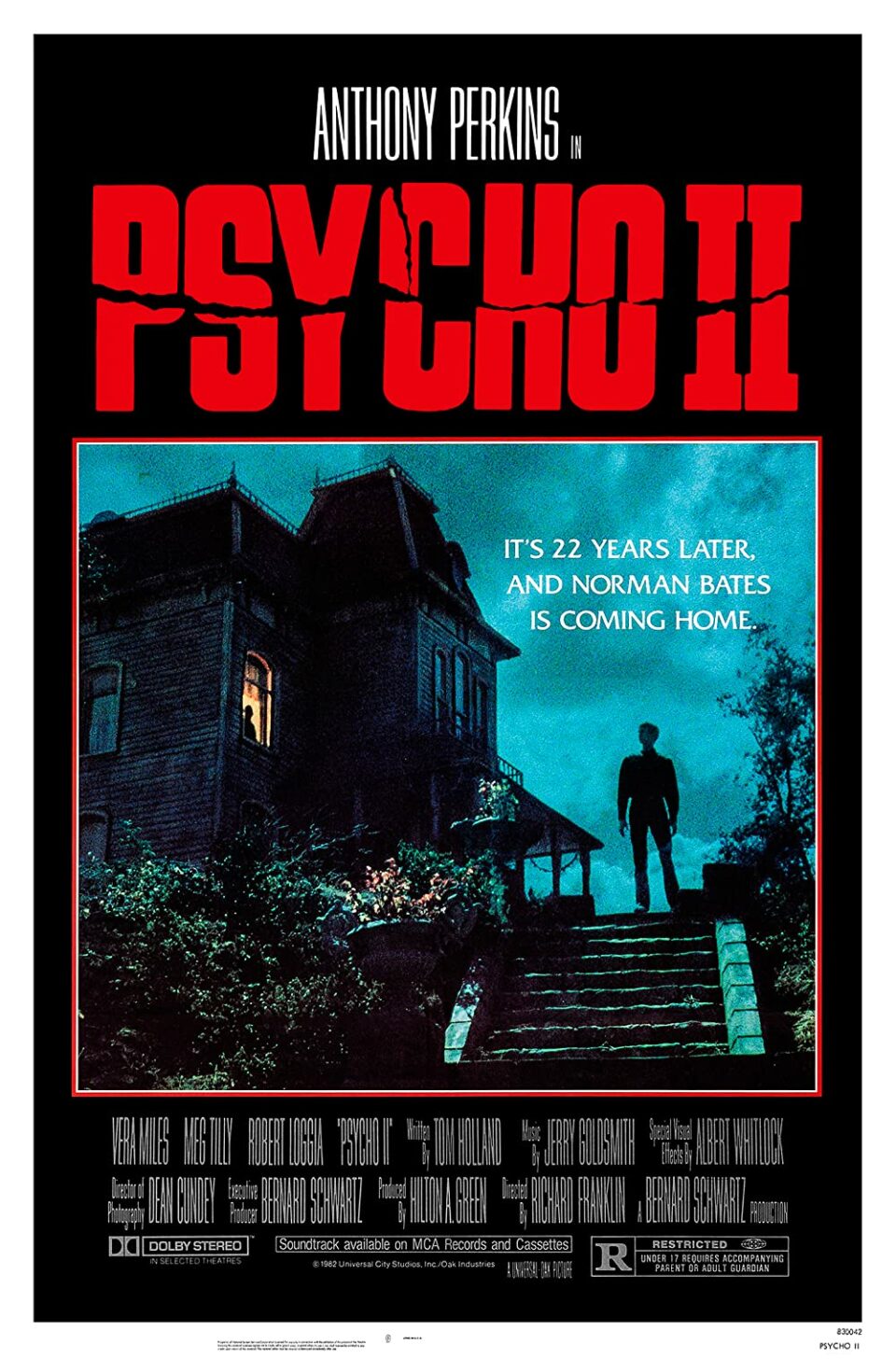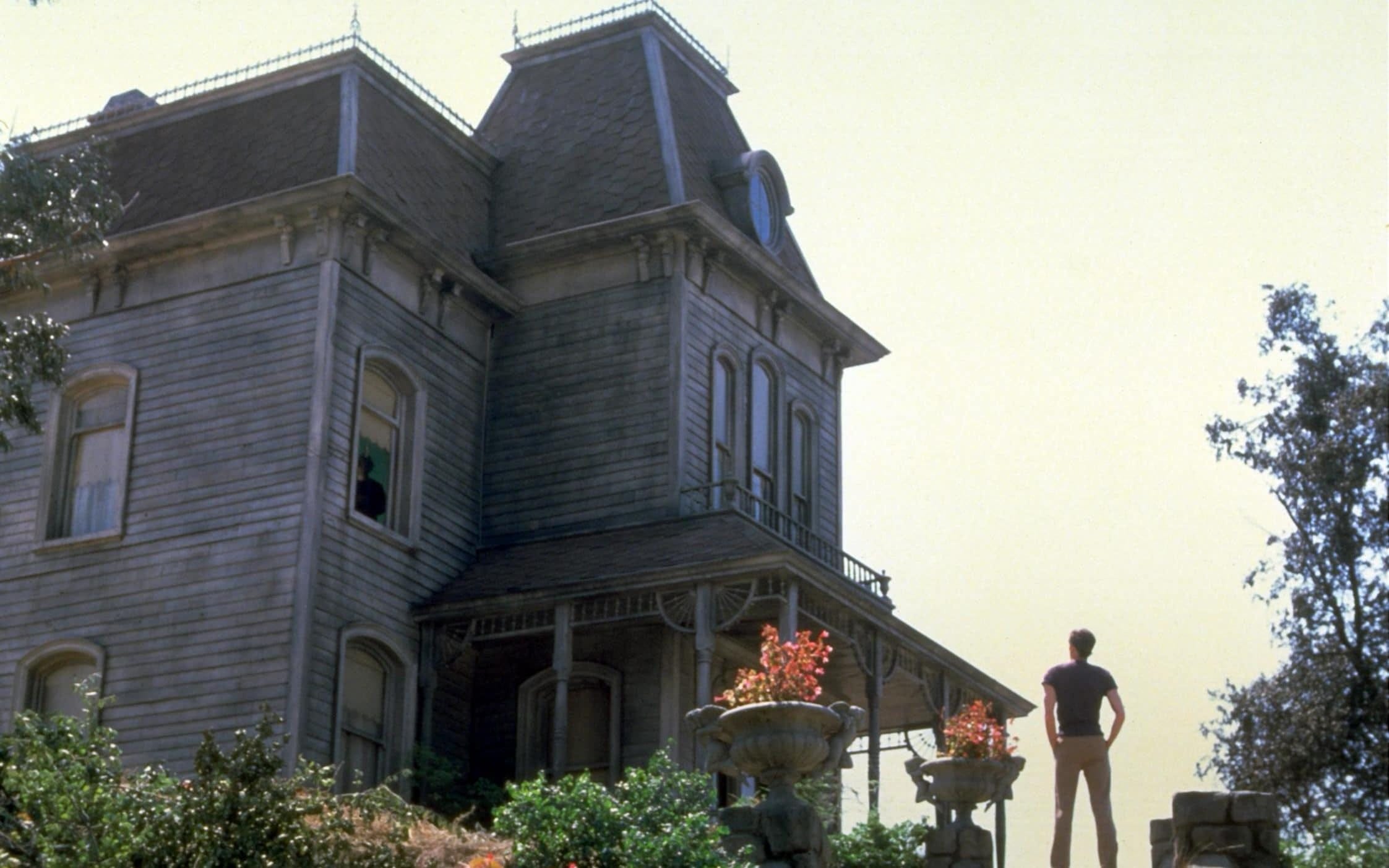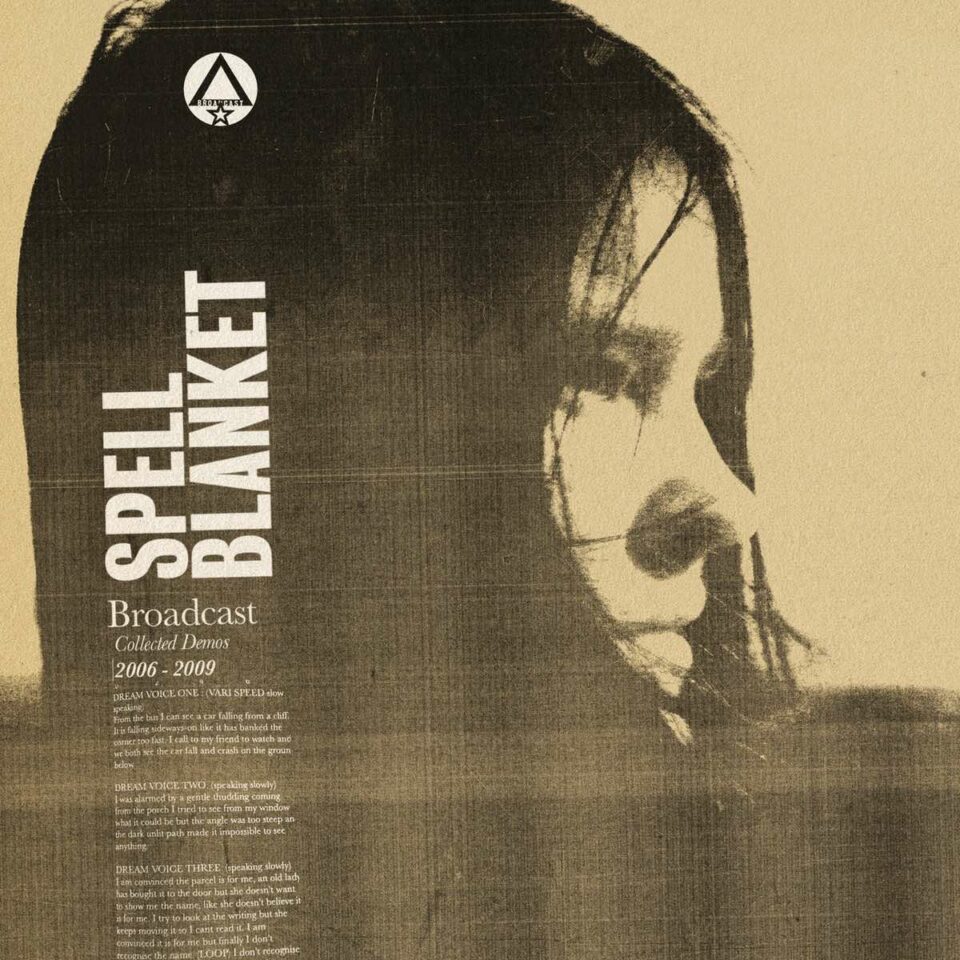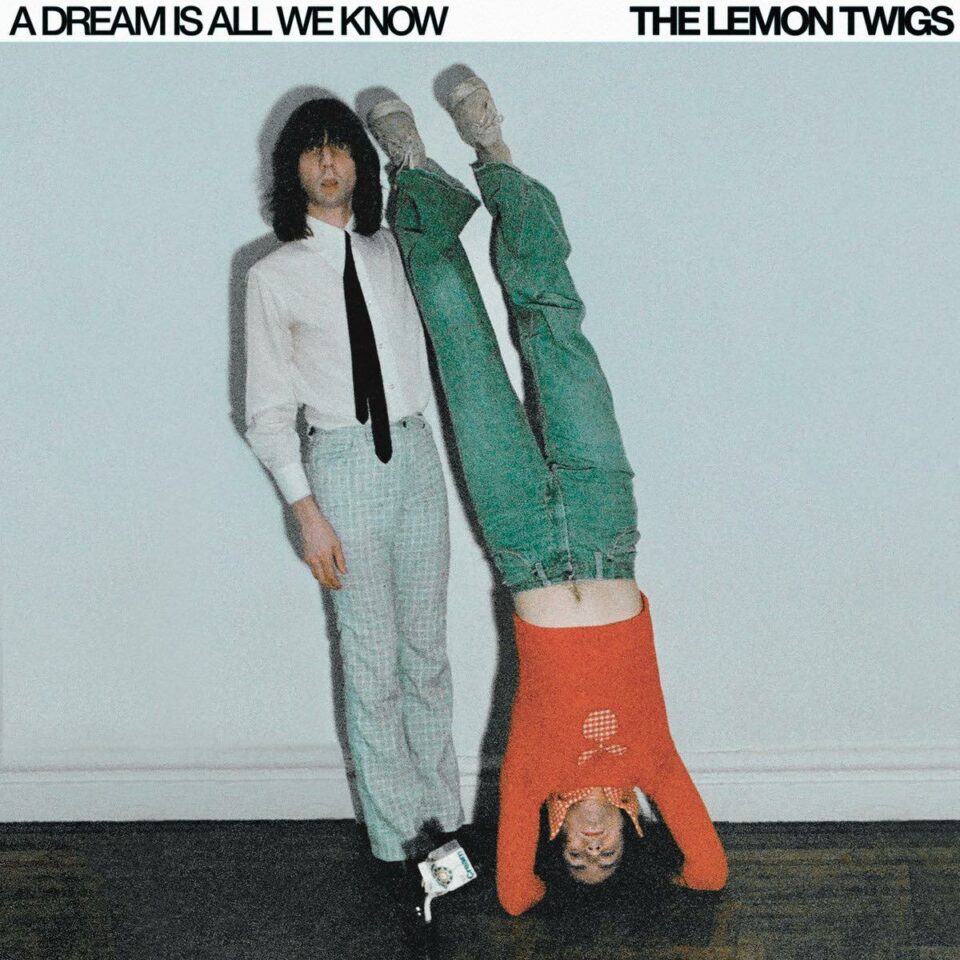“We’re all not quite as sane as we pretend to be.”
— Robert Bloch
I won’t play the righteous contrarian here: Psycho II is not as good as the original. After all, few films are. Why bother trying? It’s a Sisyphean endeavor, and will more than likely provoke fury in the chests of the moviegoers they want to attract. Alfred Hitchcock’s 1960 film is an undisputed milestone of madness and murder, an unimpeachable classic that is, note-for-note, shot-for-shot, line-for-line, as close to flawless as a Hollywood movie can get (including the unloved psychological sum-up at the end, which benefits from the respectability of the great Simon Oakland). The sights and sounds of Hitch and Bernard Herrmann—stabbing strings and the capillary-popping howl of orchestral agony as a big sharp gleaming knife plunges savagely and repeatedly—have pervaded pop culture more thoroughly than those of almost any other horror film. And it was daring! The libidinous voyeurism! The pitiless pitch of the shower drain turning into Janet Leigh’s glintless eye! The toilet flushing!
Nope, nuh-uh, no way a sequel was a good idea after a film as indelible as Psycho, 23 years later (though perhaps it was less egregious than a shot-for-shot remake 38 years down the road); it’s silly—an act, perhaps, of egomaniacal lunacy, thinking you’re a worthy successor to the portly pundit of murder (unless your name is Brian De Palma, obviously), or else a passionless ploy for box office receipts that jettisons the vitriolic satire of Hollywood horror that is the soul of Robert Bloch’s very strange 1982 novel Psycho II: Psycho House, which he wrote to reclaim his story of a deranged man and his living-dead mother from people who only think of Hitch’s original film, and risks becoming something resembling the kind of stabby-slashy films Bloch knocks.
Make no mistake, Psycho II is a wholly unnecessary piece of corporate entertainment, a film no one wanted except for the people in suits and Italian shoes who stood to make money from such an unholy idea. And you know what? Psycho II is actually pretty good. It’s an unexpectedly sincere work that tries admirably to reconcile with its own tainted intentions; it possesses an uncanny empathy for the mentally ill and how we treat them in this great land of freedom, how hard others can make it to heal. It’s that rarest of things: an ill-advised cash-grab sequel that justifies its own existence thanks to the care of the creators—thematically, narratively, spiritually, and inextricably connected to its predecessor, a natural continuation of an iconic character’s life story, a soulful progeny that respects its forebear and establishes its own identity rather than ape the oft-imitated. No one could have asked for better.
It’s that rarest of things: an ill-advised cash-grab sequel that justifies its own existence thanks to the care of the creators.
Written intelligently and enthusiastically by Tom Holland (director of the original Child’s Play and Fright Night) and directed with class by the relatively unknown Aussie Richard Franklin, the film picks up 20 years after the end of Hitchcock’s, as Norman Bates (Anthony Perkins, as gangly and tragic as ever) is deemed cured of his mental malfeasance and released back into the world to the ire of Lila Loomis (Vera Miles), still pissed that Norman butchered her sister in the shower.
Meg Tilly plays Norman’s only friend, Mary, a chummy waitress at the diner where he works who finds herself homeless when her boyfriend kicks her out. Norman offers to help, so she ends up staying in his house as he still looms minaciously over the motel that’s fallen into disrepair under the management of sleazoid Warren Toomey (Dennis Franz, a favorite consort of Hitchcock obsessive De Palma). Norman is aghast to find his motel is now a scuzzhouse frequented by the sex-crazed and drug-zonked, so he fires Toomey, who doesn’t take it well.
We also get the redoubtable Robert Loggia as the doctor who helps Norman. Loggia, who’s never not been good, has since played a foul-mouthed but loyal investigator in Jagged Edge, a volatile criminal kingpin with road rage in Lost Highway, and a past-his-prime gangster in The Sopranos. He gets to be a good guy here, and he does it so convincingly you wonder why he didn’t play good guys more often (then you remember, of course, how good he was at being bad). There’s none of his familiar menace here; he’s kind, caring, that throaty rasp now imbued with love as he reassures Norman that everything will be OK. But it isn’t OK; it never can be.

The film has the taint of slasher silliness lacing its blood—this is, after all, 1983—but it never succumbs to the ease of clichés.
Psycho II is modest yet astutely constructed, a handsome production that smartly goes for a darker, more foreboding aesthetic (an unnerving marriage of ’80s trash and gothic spookiness) than Hitch’s black-and-white clarity. Like Hitch, Franklin is eloquent and economical, but his lighting and color (mostly drab) are naturally more modern and more ominous. John Carpenter’s DP Dean Cundey infects the sets with big black shadows consuming the house like an inky sickness, and imbues the mausoleum-like rooms rife with relics representing Norman’s fatal flaw (his inability to untether himself from Mother) with texture and depth (he shot Carpenter’s movies in Super Panavision 35mm, and proves himself just as capable with 1.85). The film opens with the shower scene in its normal black and white until the camera settles on the house and it transitions into the iniquitous black silhouette of the wayward old building sitting sinisterly before a sky across which the setting sun’s entrails are smeared.
Holland and Franklin treat Norman not as a villain infected with evil but a different kind of victim: of his mother’s vitriol and the roil in his mind, a sickness not of the soul, the dark parts spreading and seeping into the synapses like a puddle of blood on a carpet.
But soon the bodies begin to pile up—lovers minced in Norman’s basement, motel managers mangled and maimed. Is it Norman? Has Mother come home? The film has the taint of slasher silliness lacing its blood—this is, after all, 1983—but it never succumbs to the ease of clichés. It’s a sincere film, one that barely resembles Bloch’s novel, a mean book written in plain-prose anger in which Norman escapes and is an unrepentant killer and necrophilic rapist, having been totally subsumed by Mother at the end of the original. In this sequel, Holland and Franklin instead treat Norman with human compassion, viewing him not as a villain infected with evil but a different kind of victim: of his mother’s vitriol and the roil in his mind, a sickness not of the soul, the dark parts spreading and seeping into the synapses like a puddle of blood on a carpet.
Norman was not born evil; he is stricken with a terrible malady, the bastard product of motherly menace and the chill of a careless society that cracks the bones of the feeble and damaged. People can change, but we don’t believe it—we won’t let them. You can see the big beating heart of a place from the way it treats its marginalized. You can’t help but feel bad for the guy. And the revelation (the first of two, so skip ahead if you want to maintain your suspenseful innocence) that Lila Loomis and her niece Mary have been, in the parlance of our times, gaslighting Norman, making him think Mother is back and he’s up to his old tricks again. In the end, their duplicity, which is its own kind of insidious, brings back the sickness—the monster.
As Bloch wrote, “Forget the past, let the dead bury the dead. Things were working out fine, and that was the only thing he had to remember.” FL









